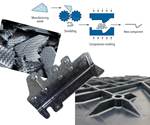CIDER project highlights rCF automotive door using Elium resin
European consortium develops novel processes, sustainable designs through three demonstrators to increase recycled carbon fiber use in transportation applications.
Source | Alexander Zoller/LinkedIn
Arkema (Colombes, France), along with project partners (see below), have revealed a 100% recyclable and recycled composite door panel made using Elium resin under the flagship project CIDER (“Circular product Design for automotive components made from Recycled and sustainable composite material”).
CIDER is combining applied research from various European companies and research institutes (see more below). Begun in August 2022, partners aim to substitute heavy steel-designed automotive parts for recycled carbon fiber (rCF) alternatives. This involves novel approaches into the design of semi-structural parts, in addition to improving their recyclability and better understanding their life cycle assessment.
The overall objective is the development of sustainable, recyclable and recycled composite materials for the transport sector. This will be achieved in developing three demonstrators over multiple life cycles of the fiber and polymer material. Detailed objectives include:
Objective 1: Design and engineering of 100% recycled and recyclable demonstrator parts to replace steel variants. Through the sustainable and circular design of a metal-free hydrogen tank and its recycling, a second-life automotive part with 100% recycling rate can be achieved. This provides a high reclamation of all materials for a cradle-to-cradle approach. CIDER will work with recyclable matrix material and use rCF as the input materials.
Objective 2: Development and production of novel nonwoven material from rCF. CIDER will develop a production technique for rCF material with higher mechanical properties to pave the way for the widespread use of recycled materials due to the application of a web drafter.
Objective 3: Substitution of critical raw materials. Through the circular use of composites, the consumption of critical raw materials such as magnesium — which is used as an alloying element in aluminum in the 5000s and 6000s alloying series, niobium, which serves to enhance stiffness of steel or titanium — can be reduced.
Objective 4: High-quality insurance of the automotive part. Through a novel nonwoven technique, the homogeneity of rCF nonwoven material will be improved. The design and simulation of rCF components will be enhanced through further testing and quality tasks of the rCF parts.
Objective 5: Holistic approach in a closed-loop economy. The hydrogen tanks will be recycled into two sustainable second life demonstrator composite parts. CIDER will even go beyond the second life application and develop possible third life products to provide a circular material solution and decrease the consumption of virgin raw material.
“The beauty and uniqueness of Elium and this program is its ability to recreate the same part after recycling without degrading the part’s properties,” says Nicolas Valloir, Arkema business manager. “This circularity has the potential to make products more environmentally friendly.”
The project funded by the Federal Ministry of Education and Research under the ERA-MIN Joint Call 2021, will be completed in July.
Related Content
-
Infinite Composites: Type V tanks for space, hydrogen, automotive and more
After a decade of proving its linerless, weight-saving composite tanks with NASA and more than 30 aerospace companies, this CryoSphere pioneer is scaling for growth in commercial space and sustainable transportation on Earth.
-
TU Munich develops cuboidal conformable tanks using carbon fiber composites for increased hydrogen storage
Flat tank enabling standard platform for BEV and FCEV uses thermoplastic and thermoset composites, overwrapped skeleton design in pursuit of 25% more H2 storage.
-
Bio-based acrylonitrile for carbon fiber manufacture
The quest for a sustainable source of acrylonitrile for carbon fiber manufacture has made the leap from the lab to the market.


















